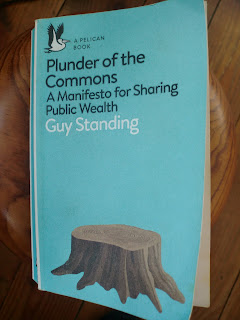“thousands
of volunteers compared Ordnance Survey maps with historical maps and found
49,138 miles of “missing” paths left off official maps drawn up in the 1950s.
They must be claimed for inclusion in OS maps by 2026 or they will vanish from
record.”
Normally
I might have shrugged and thought `that`s a shame`, but it so happened that I
was reading Guy Standing`s Plunder of the Commons at the time so my
reaction was….well …. more robust. Professor Standing`s book demonstrates how it is possible for footpaths
to go “missing”, but it covers much much more than that.
In
essence it describes how our “Common Wealth”, has been chipped away at over
centuries and in this case Common Wealth refers to a lot more than footpaths.
It includes:
“…all
our shared natural resources – including the land, the forests, the moors and
parks, the water, the minerals, the air – and all the social, civic and
cultural institutions that our ancestors have bequeathed to us…..(plus)… the
knowledge that we possess as society.”
Standing
argues that commodification, privatization, centralization and standardization have
weakened and undermined all of these. Often this has been done so stealthily
that resisting and restoring these commons once they are lost is extremely
difficult if not nigh on impossible.
The
chapter on the Knowledge Commons comes towards the end of the book, by which
time Standing has covered the Natural Commons, the Social Commons, the Civil
Commons and the Cultural Commons, analysing in each case what has been lost and
the implications for society.
And he starts the book by
pointing to a document which was created to defend and protect the Common Wealth
but which has since fallen into obscurity, despite being on the British statute
books longer than any other piece of legislation.
The
Charter of the Forest was sealed at the same time as the Magna Carter and,
Standing says, “at the time of its sealing was regarded as equally fundamental”.
In fact so important was it considered to be that “all churches in England
were required to read it out in its entirety on four public occasions each year”.
There
were seventeen articles in the original charter which spoke to the “rights of
commoners to use and manage common resources”. Professor Standing demonstrates in
some detail how these rights have been systematically abused by “monarchs, elites
and governments” and perhaps most importantly how any sense of collective
responsibility has simultaneously been eroded, for the Charter was as much
about taking responsibility for each other and future generations as it was
about rights.
He
proposes an updated Charter which would “revive the ethos” of the original, bring
it up to date and go some way towards helping “reduce inequality and strengthen
citizenship.”
It is
the difference between having permission to use all our common resources
as opposed to the right to access them. And alongside the rights comes
the responsibility of “stewarding” those resources to ensure they are available
in perpetuity. In other words, it is
about the kind of society which nurtures and sustains rather than divides and
exploits.







